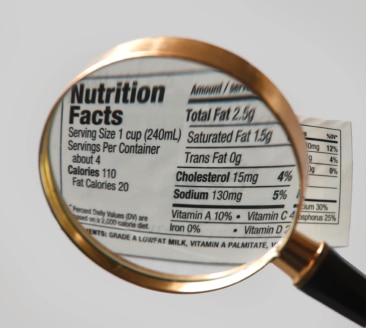 Don’t Be Fooled By Nutrition Labels
Don’t Be Fooled By Nutrition Labels
Nutrition labels provide necessary information that can help you make healthy decisions regarding the foods you eat. But, they can be misleading without some deeper knowledge of nutrition.
Nutrition labels provide information regarding the amount of calories, total and saturated fat, trans fat, cholesterol, sodium, carbohydrates, fiber, protein, and sugar per serving of food.
However, simply comparing the amount of calories found in one serving of one food to another doesn’t tell the whole story. And, neither does comparing the fiber or fat content of one food to another. And, here’s why.
Not all calories are the same, not all fiber is the same, and our understanding of fat, especially saturated fat, may be outdated or misguided.
Calories
Calories differ in the way they provide a sense of fullness or satiety. Given similar calories per serving, calories from a piece of fruit will provide a greater sense of fullness, than an equal number of calories from a candy bar or bag of potato chips. In order to satisfy yourself you will most likely eat more calories coming from the snack foods compared to nature’s candy – a piece of fruit. Also, fats provide a greater sense of satiety than do carbohydrates – just make sure they are healthy fats.
Calories coming from simple sugars or processed foods typically raise blood sugar beyond a healthy range triggering excess release of insulin, and insulin makes us fat.
Fiber
Fiber is important, and food manufacturers have made attempts to add fiber back to their processed and pre-packaged foods. But, fiber comes in many forms and those many forms are necessary for good health and become available when eating a range of whole foods. Fiber added to foods typically comes from one or two sources and some of them are known to cause gastrointestinal problems.
Fats
Supposedly, saturated fats are unhealthy, but more recent research suggests that they may health neutral at the very least, with some saturated fats potentially being healthy (like coconut oil).
The same is true for polyunsaturated fats. Some fats are healthier than others, like the omega-3 fatty acids versus omega-6 fatty acids. The ratio of omega-3 to omega-6 fatty acids seems more important than the actual grams of each fat consumed.
Whole Foods
Nutrition fact labels can be helpful, but it’s important to have a deeper knowledge of nutrition. To play it safe, focus on eating whole foods. In nature, you will never see a nutrition fact label on any of them. Whole foods don’t need a label to tell you that they are healthy to eat.
